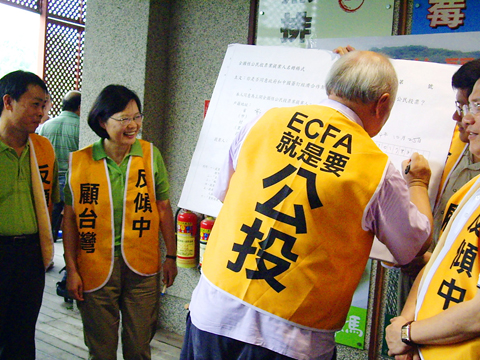The Chinese government’s plan to sign an economic cooperation framework agreement (ECFA) with Taiwan is aimed not just at bolstering cross-strait commerce, but at stifling the Taiwanese independence movement, a former US official said in Taipei on Friday.
Susan Shirk, former deputy assistant secretary of state during the administration of former US president Bill Clinton, made the remarks when asked about President Ma Ying-jeou’s (馬英九) eagerness to sign an ECFA.
Under Ma, the government has proposed signing an ECFA with China, saying that it is urgently needed for Taiwan because a free-trade agreement between China and ASEAN will take effect next year, which would further marginalize Taiwan and cripple its trade-dependent economy.

PHOTO: CNA
The Democratic Progressive Party (DPP), however, has warned that the agreement would jeopardize Taiwan’s sovereignty, make it too economically dependent on China and lead to an influx of Chinese capital and goods.
At the press event on Friday, Shirk said that she believed increasing trade across the Taiwan Strait could greatly benefit Taiwan, but added that Taiwan should never underestimate the risk and urged the nation to further investigate Beijing’s motives behind the ECFA.
Taiwan has an “efficient government” with regular, democratic elections, she said. Therefore, if the public is worried that China might eventually absorb Taiwan’s economy, the people should express their concern with their ballots.
Shirk did not elaborate whether she meant the issue should be put to a referendum.
In her book titled China: The Fragile Superpower, Shirk wrote about the disparity of wealth in China and the Chinese public’s increased desire for democracy as the economy booms.
Shirk on Friday said that as the international community witnesses the rise of Beijing, it is important to be mindful of China’s “fragile interior,” which would make Chinese authorities more stringent and harder to predict.
To quell any suspicion or worries from the international community, China’s diplomacy could be described as more flexible, she said. But despite the changes, China still has many problems.
In related news, DPP Chairperson Tsai Ing-wen (蔡英文) urged the public to sign a petition asking the government to hold a referendum on the ECFA issue during a visit to Kaohsiung City yesterday.
Tsai said her party estimated that the proposed economic treaty would affect around 4 million people, especially laborers and farmers in central and south Taiwan.
“The public must stand up and say no to Ma, who is following China and moving toward unification,” she said.
The DPP has said it plans to collect 100,000 signatures by the end of next month in the first stage of its plan to call a referendum.
Tsai said that the party hopes to collect at least 6,600 signatures in Kaohsiung City.
The Referendum Act (公投法) stipulates that the signatures of 0.5 percent of eligible voters — approximately 80,000 — must be collected to apply for a referendum.
In the second stage, 5 percent of eligible voters — approximately 800,000 — must sign the petition before the Referendum Review Committee will sanction the proposed referendum.
Ma has voiced his opposition to a referendum on the ECFA issue, saying that the proposed agreement was not a political issue.

Beijing could eventually see a full amphibious invasion of Taiwan as the only "prudent" way to bring about unification, the US Department of Defense said in a newly released annual report to Congress. The Pentagon's "Annual Report to Congress: Military and Security Developments Involving the People's Republic of China 2025," was in many ways similar to last year’s report but reorganized the analysis of the options China has to take over Taiwan. Generally, according to the report, Chinese leaders view the People's Liberation Army's (PLA) capabilities for a Taiwan campaign as improving, but they remain uncertain about its readiness to successfully seize

Taiwan is getting a day off on Christmas for the first time in 25 years. The change comes after opposition parties passed a law earlier this year to add or restore five public holidays, including Constitution Day, which falls on today, Dec. 25. The day marks the 1947 adoption of the constitution of the Republic of China, as the government in Taipei is formally known. Back then the Chinese Nationalist Party (KMT) governed China from Nanjing. When the KMT, now an opposition party in Taiwan, passed the legislation on holidays, it said that they would help “commemorate the history of national development.” That

Taiwan has overtaken South Korea this year in per capita income for the first time in 23 years, IMF data showed. Per capita income is a nation’s GDP divided by the total population, used to compare average wealth levels across countries. Taiwan also beat Japan this year on per capita income, after surpassing it for the first time last year, US magazine Newsweek reported yesterday. Across Asia, Taiwan ranked fourth for per capita income at US$37,827 this year due to sustained economic growth, the report said. In the top three spots were Singapore, Macau and Hong Kong, it said. South

Snow fell on Yushan (Jade Mountain, 玉山) yesterday morning as a continental cold air mass sent temperatures below freezing on Taiwan’s tallest peak, the Central Weather Administration (CWA) said. Snowflakes were seen on Yushan’s north peak from 6:28am to 6:38am, but they did not fully cover the ground and no accumulation was recorded, the CWA said. As of 7:42am, the lowest temperature recorded across Taiwan was minus-5.5°C at Yushan’s Fengkou observatory and minus-4.7°C at the Yushan observatory, CWA data showed. On Hehuanshan (合歡山) in Nantou County, a low of 1.3°C was recorded at 6:39pm, when ice pellets fell at Songsyue Lodge (松雪樓), a